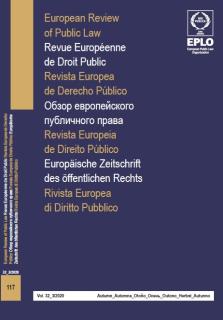
From the Relativization of the Constitution
to the “Augmented Constitution”
Professor of Constitutional Law, Law School, Aristotle University of Thessaloniki
The question in this analysis is whether a “member state”, as a state of “reduced or shared sovereignty”, has a constitution of “reduced or shared supremacy”, i.e. a less powerful constitution because its supremacy over EU law and the International Law (especially the ECHR) is disputed. I argue for the position that the relativization of the national constitution does not diminish its regulatory content and significance, but leads to the phenomenon of an “augmented Constitution” through an interesting reverse flow of case law developments, mainly at national level. We can therefore define as an augmented Constitution, the national Constitution, primarily the written, rigid and codified one, which without changing the constitutional text, strengthens its regulatory content and ensures its legal primacy through its interpretation in accordance with the EU law and international human rights law. The augmented Constitution is therefore the result of a constitutional strategy that ensures the coexistence of a plurality of legal orders and of rules that claim, in a self-referential way, legal supremacy and priority of implementation in their field. This strategy obviously includes some concessions in favor of EU law or the ECHR. In the vast majority of cases, however, it results in an augmentation of the guarantee content of the Constitution and the strengthening of democracy, the rule of law and the protection of human rights.
Dans cette analyse, la question est de savoir si un “Etat membre”, en tant qu’Etat à “souveraineté réduite ou partagée”, a une Constitution à “primauté réduite ou partagée”, à savoir une Constitution moins forte parce que sa primauté sur le droit de l’Union et le droit international (en particulier la CEDH) est contestée. Je défends la position selon laquelle la relativisation de la Constitution nationale ne rabaisse pas son contenu réglementaire et sa signification, mais conduit au phénomène d’une “Constitution augmentée” par le biais d’un intéressant courant inverse de développements jurisprudentiels, principalement au niveau national. Nous pouvons donc définir comme Constitution augmentée la Constitution nationale, principalement écrite, rigide et codifiée, qui, sans modification du texte constitutionnel, renforce son contenu réglementaire et assure sa primauté juridique par son interprétation en accord avec le droit de l’Union et le droit international des droits de l’homme. La Constitution augmentée est donc le résultat d’une stratégie constitutionnelle qui assure la coexistence d’une pluralité d’ordres juridiques et de règles qui revendiquent, de manière autoréférentielle, la primauté juridique et la priorité d’application dans leur domaine. Cette stratégie comporte évidemment quelques concessions en faveur du droit de l’Union ou de la CEDH. Cependant, dans la grande majorité des cas, elle se traduit par une augmentation du contenu de garantie de la Constitution et par un renforcement de la démocratie, de l’Etat de droit et de la protection des droits de l’homme.





















